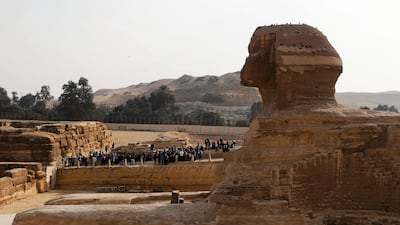The International Monetary Fund completed its first review of Egypt’s reform programme, paving the way for the North African country to draw $1.67 billion.
The total disbursement under the 12-month stand-by arrangement now stands at $3.6bn, the Washington-based lender said.
Antoinette Sayeh, deputy managing director of the fund and acting chairwoman of the executive board, commended Egyptian authorities for their handling of the Covid-19 pandemic and the related disruption to economic activity.
“The proactive measures taken to address health and social needs and to support the sectors most directly affected by the crisis have helped mitigate the economic and human impact,” she said.
The fund had approved a 12-month $5.2bn loan for Egypt in June to help it cope with challenges posed by the Covid-19 pandemic and meet its budget deficit and balance of payments shortfalls.
The approval came with the immediate disbursement of about $2bn to help Egyptian authorities preserve the macroeconomic achievements of the past four years.
The coronavirus-induced slowdown was “far less severe than expected” and Egypt is expected to be one of the few countries to register growth this year, the IMF said.
The Arab world’s third-largest economy is forecast to grow by 3.5 per cent this year, compared with a contraction of 5 per cent for the entire Mena region, the fund said.
Inflation is projected to fall from 13.9 per cent in 2019 to 5.7 per cent this year, while unemployment is expected to decline from 8.6 per cent to 8.3 per cent.
External market conditions also improved with the “strong return” of portfolio inflows to Egypt, the fund said.
However, there are risks to the outlook as the resurgence of the virus heightens uncertainty about the pace of the domestic and global recovery, Ms Sayeh said.
High levels of public debt and gross financing needs have also left the country vulnerable to global financial volatility.
“Continued strong policy implementation will further strengthen resilience and help maintain investor confidence,” she said.
Looking ahead, the expected economic recovery should allow public debt to resume its decline in the 2021 to 2022 fiscal year, the fund said.
The continued shift towards long-term debt issuance could mitigate rollover risks.
“Continued progress on fiscal structural reforms is critical to ensure additional space for high-priority spending on health, education and social protection,” said Ms Sayeh.
The Central Bank of Egypt’s policy of monetary easing in recent months should also further boost economic activity and ease the pressure of currency appreciation from large capital inflows, which has had a dampening effect on inflation.
“Two-sided exchange rate flexibility is essential to absorb external shocks and maintain competitiveness,” she said.
While the banking system has been resilient so far, ongoing financial sector supervision will be critical to maintain this as crisis initiatives begin to expire.
The IMF urged Egypt to sustain progress on structural and governance reforms to encourage “higher, greener and more inclusive” private-sector-led growth.
“The government’s ongoing initiatives to support a green recovery are welcome,” said Ms Sayeh.
The lender called for continued reforms to improve the transparency of state-owned enterprises and promote trade.
“Ensuring a level playing field for all economic agents and removing bureaucratic obstacles to private sector development will lead to durable improvements in the investment climate and governance,” she said.


